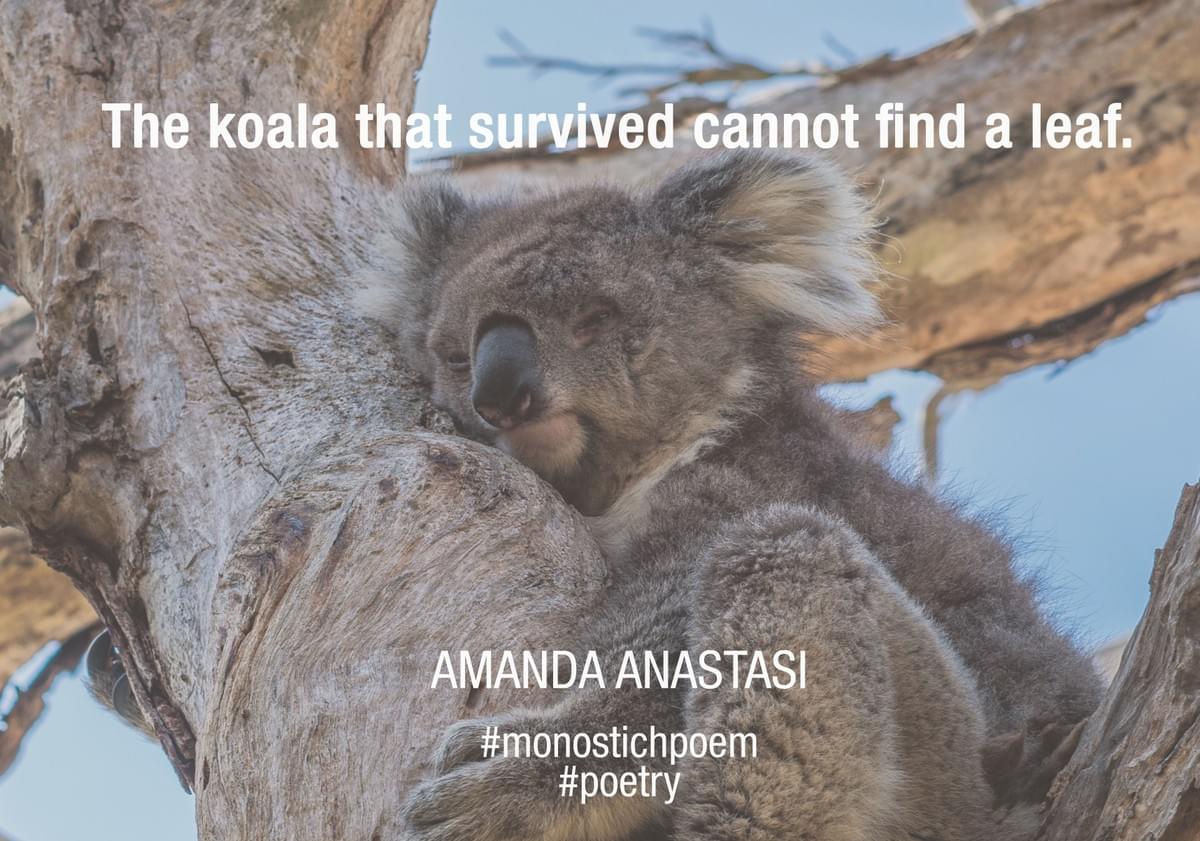Poetry is unique in the way it can hold a mirror to new and confronting realities. It is a unifier in its ability to hone in on a particular moment or place in time. As a proponent of the power of brevity in poetry and the use of the fewest words possible, the one-line poem is a poetic form of fascination for me. When writing a one-line poem, I find myself creating a hook for the reader as I summarise an entire story in a line, simultaneously inviting the reader to colour the story with their own interpretation. The aim is to create an image and an action that stays long after the poem has been read or heard. Monostich poetry was described by American poet Kimiko Hahn as "a startling fragment that has its own integrity."
Drawing on my experience of writing poetry addressing environmental catastrophe and extinction, and also currently working on a poetry collection primarily set in the year 2024, my appointment as Resident Poet at the Monash Climate Change Communication Research Hub (Monash CliComm) has allowed me to focus on the science and impacts of climate change. Among my completed poems for the Hub to date are 22 monostich or one-line poems related to climate change - some set in the future and others prompted by recent events.
The pairing of poetry and science is not altogether unusual. Both poetry and science are concerned with observational detail and unconcerned with opinion. Poetry provides the additional emotional, human element and a meeting of image and storytelling in a way that enables emotional relatability.
Following the Australian bushfires, the subject of climate change has gone from a vague and distant concept to a threat much closer to our doorsteps and domestic lives. In fact, some of the futuristic poems I wrote in the early part of 2019 for Monash CliComm are now being circulated in the form of one-line poems, seem more like current day observations and are being received as such.
I first encountered the monostich poem when reading Ian McBryde's 'Slivers', a poetry collection consisting entirely of one-line poems. My first monostich poems began apearing online from 2016, including in 'Coolabah 23: The Short Poem Issue' by the Australian Studies Centre at the University of Barcelona. In the issue's Foreword, its editor and fellow Australian poet Peter Bakowski writes that the short poem is "wit, wisdom, wordplay and wonder whittled into a dart aimed to hit the bullseye, which is you, dear reader."
For Monash CliComm, I wanted to do something new with the one-line poem, being acutely aware of the Hub's strategic preference for short, accessible messaging. Also aware that Instagram poetry was gaining popularity, I explored the idea of creating one-line poem memes for social media sharing with the Hub's director Dr David Holmes. Pairing the poems with contemporary pictorial images was aimed at both increasing the approachability and understanding of each poem and enabling social media shareability. Presenting the poems in this way was also more likely to reach current non-poetry readers.

'Koala' is one of the one-line poems featured on the Monash CliComm website. It immediately confronts the reader with the reality of the koala's plight. In a single line, it aims to capture the vulnerability and multi-pronged threat to the koala due to factors such as bushfires and past and current logging practices, and how human activity is creating multiple challenges to the species' survival.
The poem is just one of several one-line poems featured on the Monash CliComm website, the rest of which can be found here. It is my hope that those Australians feeling frustrated and saddened by the impacts and aftermath of the Australian bushfires will find some articualtion in these poems for what has occurred in their landscapes and homes and the living beings that inhabit them. The best outcome would be for the poems to engage people with the reality of climate change and facilitate further conversations about the actions needed going forward.
Amanda Anastasi is an Australian poet and author of 'Taking Apart the Bird Trap' (Recent Work Press, 2024) and 'The Inheritors' (Black Pepper, 2021). Amanda was Poet in Residence at the Monash Climate Change Communication Research Hub and a Wheeler Centre Hot Desk Fellow. Her work has been published in journals and anthologies locally and internationally, including in Australian Poetry Journal, Griffith Review, The Massachsetts Review and Best Australian Science Writing.